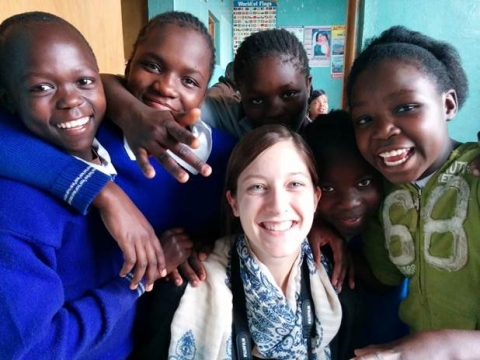
PBS NewsHour editor Ellen Rolfes participated in an ICFJ program in Kenya. Photo courtesy of Ellen Rolfes.
During a recent visit to Kenya for an ICFJ exchange program, PBS NewsHour editor Ellen Rolfes reported on a groundbreaking program: Teaching girls to save money so they will be less dependent on men – and therefore less susceptible to sexual assault, pregnancy and HIV. PBS.org published the story on World AIDS Day.
The Safe and Smart Savings program is offered at Zeyln Academy, a school in Kenya’s largest slum, where an alarming number of young girls are susceptible to HIV and sexual abuse. The program provides a safe space for the young women to talk about two subjects that are considered taboo in most of their homes: saving money and sexual health.
Though work is scarce, some girls do extra chores for the family business or help clean or wash clothes for neighbors. In this program, they are mentored to be careful about working for single men—and how to best protect themselves if they do. They are also urged to stash some of the funds away.
“By giving girls the tools they need to save even a little bit of their money, the Safe and Smart Savings program aims to help them avert risky and vulnerable sexual behavior when a financial need or crisis occurs,” Rolfes reports. “In addition to meeting once a week for a lesson and discussion, mentors help each girl to set up a savings account at the bank, something that might be otherwise impossible.”
Rolfes’ visit to Kenya was part of ICFJ’s two-phase exchange program, “Strengthening Professionalism and Investigative Journalism in Africa.” In the first phase, Kenyan journalists spent four weeks in the United States, much of the time working with mentors in newsrooms to produce stories. In the second phase, Rolfes was among four U.S. journalists who went to Kenya where they visited the newsrooms of the Kenyan participants. Rolfes also had an opportunity to report while she was in Kenya ahead of World AIDS Day.
The Ford Foundation sponsored the “Strengthening Professionalism and Investigative Journalism in Africa.”
Read the full article on PBS.org.